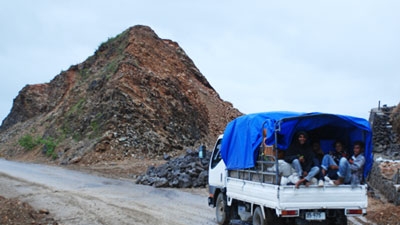It is hoped that a better road network will improve access to markets for local farmers in prime coffee producing districts such as Ermera, Aileu, Ainaro and Manufahi, where most of the coffee plantations in the country are located. It will also help connect remote rural communities to important services, such as those found in health centers and schools.
“If we can manage to bring our coffee directly to companies in Dili, we can get a better price compared to waiting for companies that come to buy from us. However the transport cost is still a major challenge due to the road condition”, said Mario Araujo, a coffee farmer in Ainaro district. “One day if the road is fixed, there will be more cars operating and the price of travel will be lower.”
Road infrastructure is one of the World Bank’s main focuses in Timor-Leste
The Road Climate Resilience Project supported by the World Bank is working to improve conditions along the road with the Government of Timor-Leste. The first step involved essential emergency work, including improvements to drainage. Activities will then commence in mid-2013on the upgrading of the entire road.
Managing risks of erosion and improving drainage remains a challenge. To ensure that the roads can withstand rain and flooding, the technicians have conducted several studies along the road to ensure that the best possible road will be built to benefit the Timorese.
Apart from its support for the coffee industry and other valuable resources found along the Dili-Ainaro road, the World Bank is working closely with the Ministry of Tourism through the Road for Cultural Heritage Project to identify cultural heritage sites. These sites have potential touristic value and can offer local communities increased livelihood opportunities.
“Building a better road network will give more access to people in rural areas, particularly the farmers, to sell their products to the markets,” said Luis Constantino, the World Bank Country Manager for Timor-Leste. “This will positively impact the economic development of the Timorese nation, especially rural communities who are often cut off from opportunities by the most basic lack of infrastructure”.
The forthcoming World Bank Country Partnership Strategy (CPS), which will provide the framework for the Bank’s future engagement in the country, is being developed for the period 2013-2016. The CPS has been developed through consultation with more than 2,000 people, ranging from community leaders, women’s groups, students, and other organizations, to reflect the needs and desires of Timorese.
One of the proposed focus areas is building core infrastructure to connect communities to markets and services, like health centers and schools, and to support rural development. The CPS is aligned with the Government’s National Strategic Plan, which highlights the importance of road infrastructure for the country’s development.

